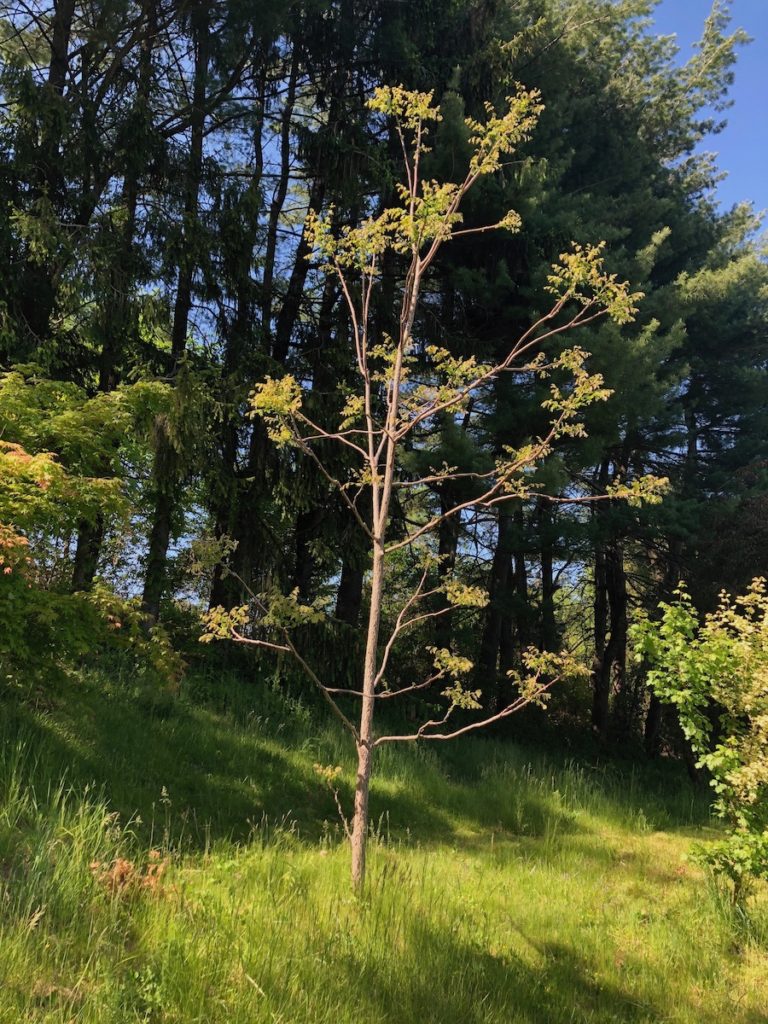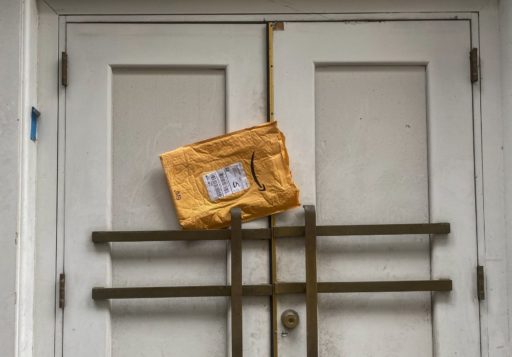Kentucky Coffeetree
Today marks the ninth anniversary of my father’s death. To honor him, we planted a Kentucky coffeetree in the yard. The choice of tree species had nothing to do with my father; I had seen it in the Philadelphia area and liked its look and color. I also knew it was something of a warmer season tree than ideal for the inland Connecticut growing zone. It hasn’t struggled, however.

Unlike my father, who was something of a misfit most of his life and who only rarely and fleetingly ever could acknowledge how much I loved him and still do. Milton Klein, born in Brooklyn in 1921, was something of a tech genius. He loved motors, wires, pumps and valves. By profession he was an electrical engineer, but he had been forced into that trade by his father, who demanded my dad major in electrical engineering at a prestigious free university in Manhattan he attended, the Cooper Union. My father really wanted to go into mechanical engineering but relented and spent most of his professional life designing circuit boards and stereo chassis for a variety of electronics firms.
At home he could fix anything. I have so many memories of walking into the kitchen and seeing him splayed out, legs protruding from under the sink with a pile of tools by his side as he clanked away on the plumbing. Or the car hood would be up and I would see the lower half of his body braced against the front of the car while the rest of him was half way into the engine block and he’d ask me to hand him a wrench. Downstairs in the basement he taught me how to use an oscilloscope so I could test the galvanic response of various small mammals I would dissect during a pre-med phase I went through during junior high school. When it came to carpentry, he was pretty handy too; having single-handedly built the dormer to our second floor in which I lived with my two brothers.
The mechanical prowess made up for the loose wiring in his brain. He never got a proper diagnosis. A succession of psychiatrists could not agree. What I remember were the many plastic containers of prescribed medicine lined up in the downstairs bathroom cabinet – thorazine, stelazine, and for a while lithium coupled with a mood stabilizer. He was in and out of mental hospitals my entire childhood. He would disappear for a few days or weeks, then return, my mother constantly fretting, and my father alternatively effusive in his technical forays or deeply withdrawn and spaced in – a state we would call his “zombie” mode.
I never thought he was a textbook manic-depressive, though he did have his moods swings – but don’t we all? I spent a lot of time talking with him about it. He was able to tell me stories about his upbringing: his fights with his dad, the betrayal by a shrink who turned out was experimenting on him without permission, the straight jacket episodes and electroshock. It was all very 1950s, and then followed by a more pharmacological approach to treatment in the 1960s and early 1970s.
I always got the feeling from him that he didn’t fully know he existed. It became my role to help him discover the fact that he was actually a human being. In the process I became the loving father he never had. I took him to his first baseball game in 1964 (Cardinals at Mets, the Thursday night after the All-Star game). I still remember how the Mets won on a walk-off, two-run homer by pinch-hitter Frank Thomas. My father actually got excited and raised his arms in joy.
I could dragoon him out into the back yard for the occasional catch, but not for long. The one time I took him out for his only effort at golf he hit a few shots at a favorite course of mine along the saltwater marshes of southern Longs Island, but after one hole had had enough..
There were a few tender moments, though not many. When I was 12 years old and had just read “The Diary of Anne Frank.” I had a long conversation with him about how much the book meant and he stood there and actually hugged me. A few years later we attended a Broadway performance of “Man of La Mancha.” At one point I turned and saw him crying as Miguel de Cervantes/Don Quixote sang “The Impossible Dream.”
My father loved music. He played the violin his entire life and spent decades in second chair with a local symphony orchestra. His marriage with my mother lasted a month under 60 years but was missing something basic; namely, evidence of affection. They were always together but often bristling at the proximity. My father’s emotional instability had long ago set my mother on edge and she, in turn, internalized the role of family housekeeper and nurse, though nervously so.
Like a lot of people with mental illness my father’s condition got less worse in later years. He became sweeter, more appreciative, and almost expressive of a loving inner life. He also remained very strong physically. What brought him down was not an organic ailment but the long term consequences of a traffic accident he miraculously survived and that simply weakened his system slowly over his last four years.
So now the Kentucky coffeetree stands in his place, so to speak. It’s doing quite well and serves as a reminder. I’m glad we planted it and that it leafs out when it does. Turns out it’s not misfit at all.

Hi Grandpa!!!
So I just read this and this was very sweet and nice. 🙂
I liked reading it. 😀
I am so glad you read this, Mina. I love it when you get to know us more and I am sorry you did not get to spend time with my father. He would have loved you very much and you would have found him to be a lot of fun in his own way.
Hello Bradley,
Truly a touching story about your father. In my experiences with many engineers, they feel things quite deeply, have keen insight and can truly fix anything (this includes people). It’s therapeutic to discuss the things which bring us trouble –as getting it out is therapy. This allows us to heal. Glad you filled the need resulting in an improved relationship. In time and with age, many things/people/situations improve and misfits can be disguised as Kentucky coffee trees that have a certain fragility within. I wonder if “violins” can be made from this Gymnocladus dioicus?
Thank you for sharing…
Sweet memories. Very nice. He obviously was an accomplished father to some degree as evidenced by this piece.
Dear Bradely ,
That’s very touching ..
May he rest in peace ..
Brad — this is absolutely beautiful. Thank you so much for sharing.
Wonderful piece, Brad. We all have stories to tell about our dads, some more poignant than others. Yours is at the top of the list.